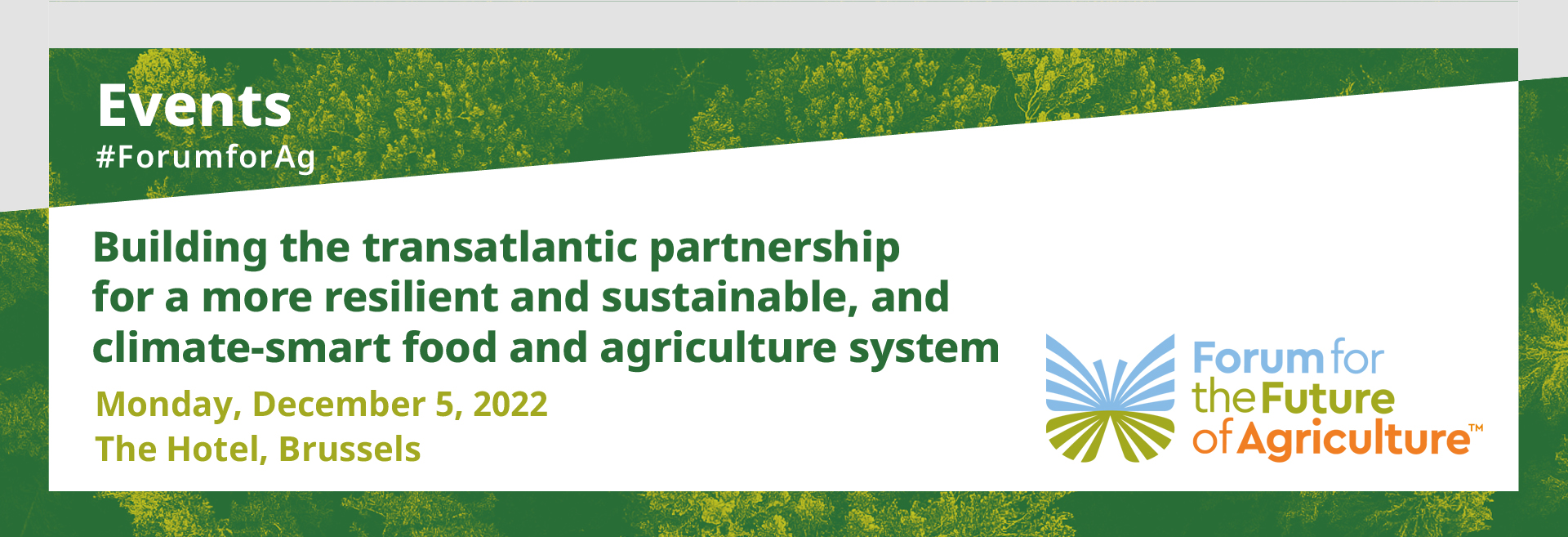Building the transatlantic partnership for a more resilient and sustainable, and climate-smart food and agriculture system
2022 meeting - Session 2 summary
Monday, Dec 05, 2022
Defining and delivering on sustainable trade objectives
Jason Hafemeister, Acting Deputy Under Secretary for Trade and Foreign Agricultural Affairs, USDA, the first of two key speakers, identified productivity as the key for farmers to both provide food and protect the environment. An open, transparent, market-oriented and predictable trading system is essential.
The system should not restrict trade in products from new technologies; should include objective health and safety standards which can’t be used as protectionism; help build the market for climate smart production; and encourage global exchange of information and sharing of best practice. Trade is “the cornerstone of the approach to a sustainable system”.
Maciej Golubiewski, Head of Cabinet of Commissioner for Agriculture at the European Commission and second key speaker said the EU was “open for business in our agricultural model and export model and trade model”. It is supporting a global transition towards more sustainable agri-food systems.
The EU includes sustainable food systems provisions in its trade agreements as “a way to transfer those commitments that we have to how we deal with our partners”. Mr Golubiewski acknowledged that while the EU and US agree on the need for open trade, the “question of how to get there on sustainability” is still under discussion. “There is understanding that we can work together on this,” he concluded, adding: “There is a realisation that sustainability has to become part and parcel of free trade.”
Panel discussion on trade, sustainability and productivity
Marta Zuluaga Zilbermann, VP Government Relations Europe, Middle East & Africa, Cargill, described the company’s role as “to get food from where it is produced to where it is needed”, working with farmers and customers in over 70 countries. Trade must remain open to allow companies to handle unforeseen events like the pandemic, adapt to climate change and meet global food needs. Through its RegenConnect regenerative agriculture programme, Cargill is helping farmers to reduce fertilisers and end tillage, providing compensation, incentives, verification and measurement services, technical support and trying to find markets to reward producers for their new practices.
Jeffrey Nawn, CEO/Founder at North Hill Group, approached the discussion as a regulatory practitioner. Trade policy regimes, environmental and food safety risk assessments are struggling to keep up with the pace of innovation. “What you find in agricultural innovation firms, is that we go where were loved. And right now, that’s not Europe.” Instead the firms go to Central and South America, Japan and the Philippines where workable regulatory systems for gene edited products are in place.
Without harmonised systems or a common goal, he predicted the gains from new technologies could be lost. “The key question is not can we make agricultural products more sustainable…It is can we sell those products when we do?”
John Clarke, Director for International affairs, DG AGRI, European Commission, described sustainability and productivity as “mutually reinforcing”. Open trade is probably conducive to more sustainable production due to comparative advantage with each partner playing to its strengths. However, countries need to put in place “explicit deliberate policies to make their production more sustainable, as we are trying to do in the European Union”.
Alan Matthews, Professor Emeritus of European Agricultural Policy, Trinity College, Dublin, agreed open trade has advantages, but suggested there was a case for limiting access to the EU for clearly unsustainable products. Governments tend to use regulation against the negative externalities of unsustainability and “the problem for international trade is when national regulations differ”.
Regulations do not need to be the same everywhere, but cooperation between administrations could help avoid friction. A forum is needed to discuss sustainability standards and he noted the EU had proposed the mandate of the FAO’s Codex Alimentarius Commission be extended from health and hygiene to include these.
Ted McKinney, Chief Executive, National Association of State Departments of Agriculture (NASDA), criticised the EU’s precautionary principle and elements of the Green Deal, arguing that between the US and the EU “there is a very wide chasm that seems to be getting wider”. Quoting a study by the USDA Economic Research Service critical of recent EU initiatives, he said: “If some elements of farm to fork advance, it will be a dramatic deterrent to trade generally”.
In response, Mr Clarke described the American study as “very selective” with “some inherent limitations”. The EU and US share the same objective of more climate friendly agriculture, but differ in how to achieve the target. “I think our approach is perfectly legitimate, is based on science, is not protectionist and is not discriminatory,” he said. Mr Golubiewski also pointed out that farm to fork is a political, aspirational strategy containing flexibility and safeguards, not a legislative document.
Closing session
Alain-Dominique Quintart, Head of Government & Public Affairs EAME, Syngenta, summarised some of the key points to emerge from the two panels. Innovation is key and smart agriculture can help tackle climate change. Free trade is critical, new business models can be created and enabling conditions need to be further developed. Sustainability and productivity are mutually enforcing. “That’s the motto of the Forum for the Future of Agriculture.”
Click here to view videos from this event.
Click here to view the agenda and speakers bios from this event.





